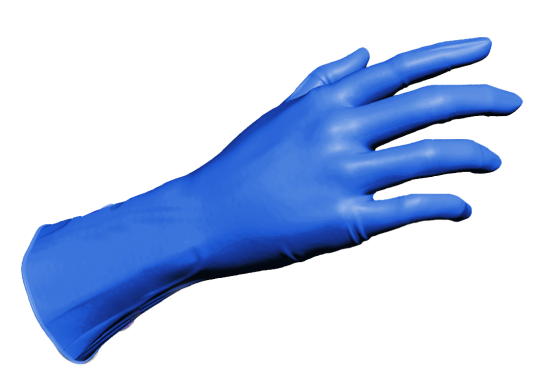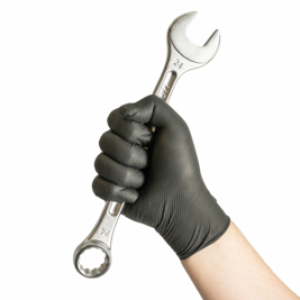Nitrile gloves
Tough, flexible and comfortable, nitrile gloves are also latex-free, making them suitable for allergy sufferers.
Their exceptional durability and protection against pathogens, chemicals and contaminants make them the preferred choice for the medical sector, the food industry, laboratories and many other demanding environments.
Also discover our latex and vinyl gloves, or explore our entire range of single-use gloves.

-

Glove Herkul Grip Strong
-

Glove Kolmi Coverfeel Care
-

Glove Kolmi Coverfeel Care Long
-

Glove SafeTouch® Vitals
-

Glove Kolmi Coverfeel Touch
-

Glove SafeTouch® Vitals
-

Glove Safetouch® Black Lite
-

Glove Herkul Grip Extra Strong
-

Glove Herkul Grip Strong
-

Glove SafeTouch® Rejuvenate
-

Glove SafeTouch® Advanced Black
-

Glove SafeTouch® Long
What are nitrile gloves used for?
Nitrile gloves are indispensable in many sectors for their ability to offer reliable protection against pathogens, chemicals and contaminants. Their versatility, strength and durability make them a preferred choice for professionals seeking to maintain high standards of safety and hygiene. What's more, nitrile gloves are made from synthetic rubber, making them latex-free and therefore suitable for people with latex allergies.
ADVANTAGES OF NITRILE GLOVES
 Superior resistance
Superior resistance
Nitrile gloves offer excellent resistance to punctures, tears and many chemicals, often surpassing latex and vinyl gloves in terms of durability.
 Less allergenic
Less allergenic
Containing no latex proteins, they are ideal for users with latex allergies.
 Comfort and fit
Comfort and fit
Designed to fit comfortably in the hand, nitrile gloves offer good dexterity and tactile sensitivity for precise movements.
 Versatility
Versatility
Available in a range of thicknesses and sizes, they are suitable for a multitude of tasks, from chemical handling to kitchen use.
RECOMMENDED USES
 Medical sector Medical sector  |
|
Used for examinations, surgical procedures and patient care, nitrile gloves provide an effective barrier against pathogens and contaminants. |
 Maintenance and cleaning Maintenance and cleaning  |
|
Ideal for cleaning and maintenance tasks, their resistance to aggressive chemicals protects users' hands. |
 Food industry Food industry  |
|
Suitable for food preparation and handling, these gloves prevent cross-contamination and comply with food safety standards. |
 Laboratories and research Laboratories and research  |
|
Perfect for handling chemical substances and biological samples, nitrile gloves provide protection against aggressive chemicals. |
 Tattooing and piercing Tattooing and piercing  |
|
Their puncture resistance and tight fit make them ideal for tattoo artists and piercers. |
 Automotive industry Automotive industry  |
|
Used for handling solvents, oils and other chemical substances, nitrile gloves are essential for mechanics and automotive technicians. |
How to choose disposable gloves: nitrile, latex or vinyl?
The choice of disposable gloves depends on a number of factors, including intended use, possible allergies and the level of protection required. Here are a few tips to help you choose between nitrile, latex and vinyl gloves.
LATEX GLOVE
Latex gloves are made from natural rubber. They offer excellent elasticity, tactile sensitivity and a comfortable fit. However, they can cause allergic reactions in some people due to latex proteins.
NITRILE GLOVE VS VINYL GLOVE?
| Resistance | Comfort | Protection | Use | |
|---|---|---|---|---|
|
NITRILE GLOVE |
Highly resistant to punctures and chemicals. |
Tight fit with good elasticity. |
Excellent protection against pathogens and contaminants. |
Ideal for high-risk environments requiring reliable protection. |
|
VINYLE GLOVE |
Less resistant to punctures and chemicals. |
Less snug-fitting and less elastic than a nitrile glove. |
Basic protection against contaminants, for low-risk tasks. | Suitable for short-term tasks and low-risk environments. |
![]() Choose nitrile gloves for maximum resistance and protection, especially if you work with chemicals or in high-risk environments.
Choose nitrile gloves for maximum resistance and protection, especially if you work with chemicals or in high-risk environments.
Powdered or powder-free nitrile gloves?
| Advantages | Use cases | |
|---|---|---|
| POWDERED GLOVES |
The powder makes the gloves easier to put on and take off, reducing the risk of tearing when putting them on.
The powder helps to absorb moisture and perspiration, providing greater comfort during long periods of use.
Ideal for fast-paced environments where gloves need to be changed frequently. |
Where gloves need to be changed quickly and frequently.
For fast food handling, although the powder may not be ideal for all types of food preparation.
Ideal for hairdressers or beauty professionals who frequently put on and remove gloves (e.g. dye or mild chemical applications). |
| POWDER-FREE GLOVES |
The absence of powder minimises the risk of allergic reactions and skin irritation, particularly for sensitive people.
Without powder, there is less risk of contamination of products or surfaces, which is crucial in sterile or sensitive environments.
Eliminates powder residues that can settle on clothing or work surfaces. |
Where sterility is paramount and powder residues could be a problem.
For tasks requiring strict hygiene and to avoid contamination of foodstuffs.
Where precision and cleanliness are essential. |
|---|
Powdered gloves are ideal for quick and easy donning, especially when hands are wet or when changing gloves frequently.
Powder-free gloves are preferred in environments where reducing the risk of contamination and allergic reactions is essential, such as medical, food and laboratory environments.
Advice on using nitrile gloves
 FITTING THE GLOVES
FITTING THE GLOVES
- Wash your hands with soap and water, then dry them thoroughly.
- Select the appropriate glove size for optimum fit.
- Put the gloves on, adjusting each finger and covering the wrist well.
 WEARING GLOVES
WEARING GLOVES
- Inspect gloves for tears or punctures. Replace them immediately if necessary.
- Change gloves regularly, between patients or tasks, to avoid cross-contamination.
 REMOVING GLOVES
REMOVING GLOVES
- Pinch the outside of the glove at the wrist, turn it inside out and wrap it with the other glove before disposing of them in an appropriate waste bin.
- Wash your hands after removing the gloves.
 DISPOSING OF GLOVES
DISPOSING OF GLOVES
- Dispose of used gloves in an appropriate waste bin, preferably a pedal bin, to avoid direct contact.
- Follow your institution's protocols for disposing of medical waste.
IMPORTANCE OF WEARING GLOVES CORRECTLY IN THE MEDICAL SECTOR
Prevention of cross-infection
By changing gloves between each patient or procedure, healthcare professionals considerably reduce the risk of transmitting infections from one patient to another.
Compliance with safety standards
Compliance with glove safety standards is crucial to maintaining a safe medical environment. This includes compliance with glove change and disposal protocols to ensure safety for all.
Environmental impact
We strive to reduce our environmental impact by adopting sustainable practices in the design, production and marketing of our products.
